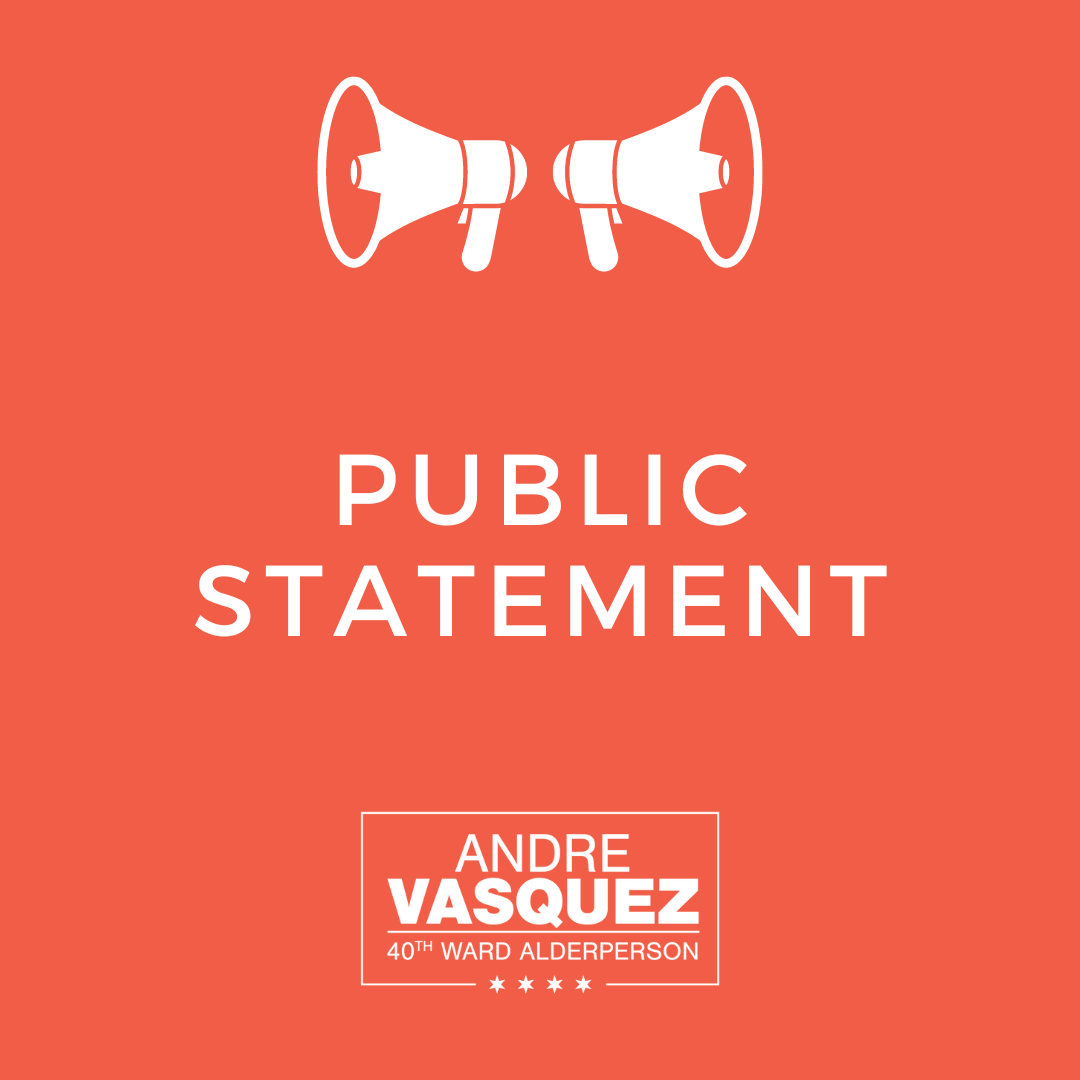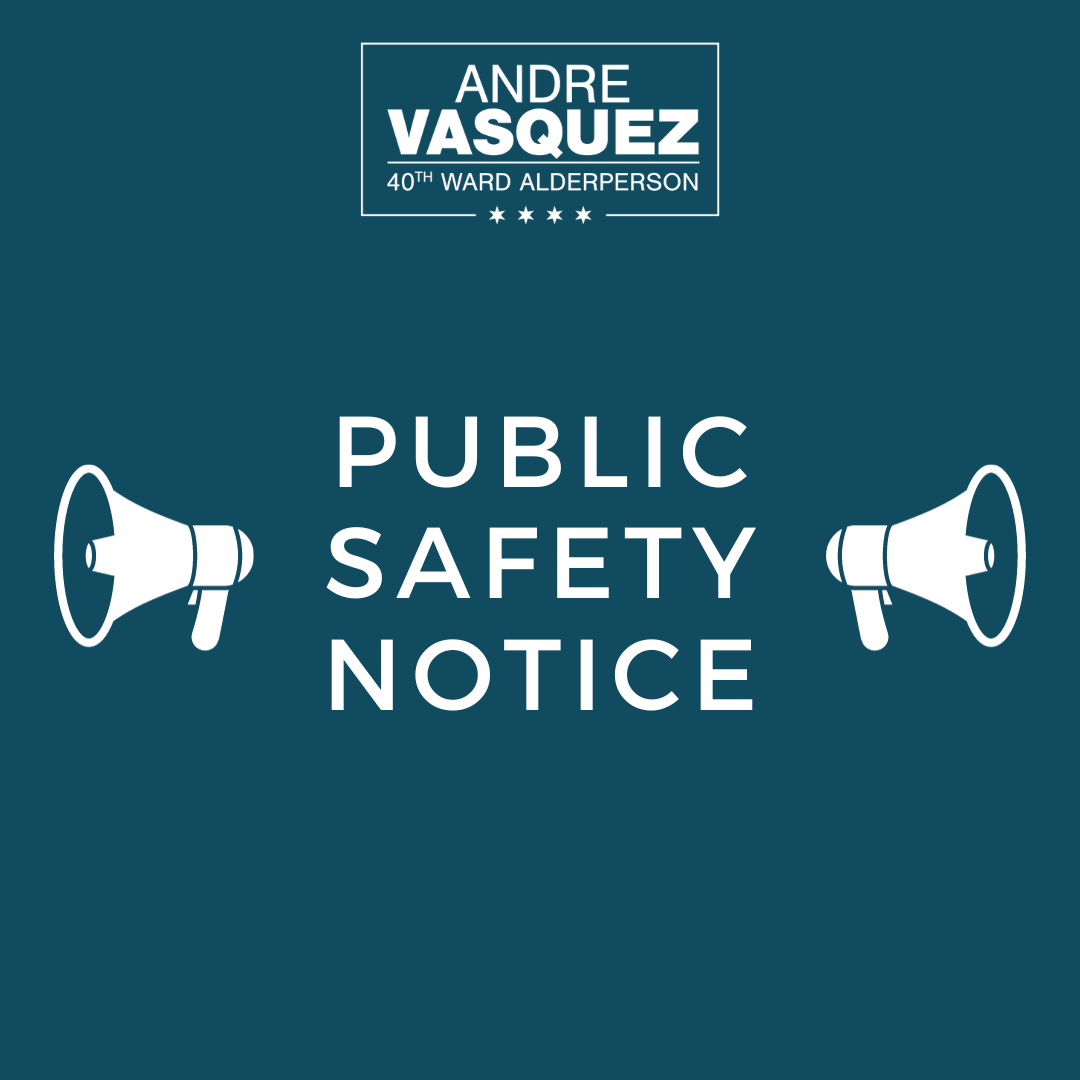The 40th Ward is consistently one of the Top 5 safest wards in the City of Chicago. Our office is invested in improving public safety by expanding our existing violence prevention and mental health first responder programs, and by addressing root causes of violence with social services, peer-to-peer mediation, and housing and job stability. In addition:
- Fighting to ensure that our officers have improved access to mental healthcare
- Installation of License Plate Reader Cameras across the ward to aid in investigations after incidents
- Working with Gang Intervention Teams to address and mitigate conflict in the 40th Ward
- Established Empowering Communities for Public Safety (ECPS). Currently partnering with District Council candidates to be public safety liaisons for our neighbors
License Plate Reader Cameras have been installed in a number of arterial intersections to aid in evidence gathering for investigations, and have recommended that neighbors take advantage of the city’s Home and Business Protection Program, which can provide reimbursement for neighbors who want to purchase cameras to also aid in evidence gathering if an incident were to occur.
To learn more about the License Plate Reader program, visit the City of Chicago Home and Business protection page.
Find your police beat
Each Chicago police district is divided into three sectors. You can find your Police District by address. Each sector is further divided into three to five beats. A team of beat officers patrols your beat on a 24-hour-a-day basis. Teams of rapid response officers patrol by sector and handle many of the emergency calls in that sector.
Each beat is numbered. The first two digits identify your district; the next digit is the sector number, and the last digit is the beat number.
For example, Beat 2013 is the 20th District, 1st sector, 3rd beat. Your beat patrol car has its beat number displayed above the blue lights on its roof.
View the interactive Google map showing the 40th Ward area, police districts and contact information for beat meetings.
Police Districts in the 40th Ward
In case of emergency dial 9-1-1. For non-emergencies dial 3-1-1.
Our 40th Ward officers are present and active in the 17th, 19th, 20th, and 24th Police Districts. Each police district here is linked to the Chicago Police Department district listing. You will find community alerts and contact information there. View the Community Engagement Calendar for each district to find upcoming beat meetings and other community engagement events.
20th District – Lincoln
- 5400 North Lincoln Avenue, Chicago, IL 60625
- Tel: 312-742-8714
- Beats: 2011, 2012, 2031, 2032
- Community Engagement Calendar
24th District – Rogers Park
- 6464 North Clark Street, Chicago, IL 60626
- Tel: 312-744-5907
- Beats: 2413, 2432, 2433
- Community Engagement Calendar
19th District – Town Hall
- 850 W Addison, Chicago, IL 60613
- Tel: 312-744-8320
- Beats: 1911
- Community Engagement Calendar
17th District – Albany Park
- 4650 W Pulaski, Chicago, IL 60630
- Tel: (312) 742-4410
- Beats: 1712
- Community Engagement Calendar
Chicago Alternative Policing Strategy (CAPS)
The partnership between police and community is the foundation of Chicago’s philosophy of community policing, known as the Chicago Alternative Policing Strategy (CAPS). CAPS Beat Meetings provide a regular opportunity for police officers, residents, and other community stakeholders to exchange information, identify and prioritize problems, and begin developing solutions to those problems.
The Chicago Police Department’s Education and Training Division offers problem-solving training for the community. To schedule training for your beat, contact the Community Education Section at 312-746-8310 (Monday through Friday, 8 a.m. to 4 p.m.).
What are CAPS meetings for?
Beat community meetings are regular meetings held on all 285 police beats in Chicago. Every beat is required to meet at least quarterly, although the vast majority of beats meet every month or every other month.
The primary purpose of the beat community meeting is to allow beat residents, other community stakeholders and police to discuss chronic problems on the beat and to engage in problem solving using the CAPS five-step problem-solving process. Beat community meetings provide an opportunity for police and community residents to exchange information about conditions in the neighborhood, to identify crime and disorder problems, and to develop strategies to combat those problems. The meeting also provides an opportunity for police and community to get to know one another.
- Download the Beat Meeting Pamphlet (PDF)
Who conducts CAPS beat meetings?
Beat community meetings are hosted by the Chicago Police Department and are usually conducted in one of three ways:
- By a team consisting of a resident beat facilitator (a designated community leader) and a beat officer.
- By one or more beat facilitators.
- By one or more beat officers.
Option 1 is usually considered ideal.
Beat meetings and problem solving are most effective when they include a broad range of community stakeholders: residents, business owners, and representatives from local schools, churches and neighborhood organizations. In addition, beat officers representing all three watches, plus a sergeant, are expected to attend beat community meetings. Neighborhood Relations personnel, tactical and gang tactical officers, detectives, and other Police Department members may attend beat community meetings, as appropriate.
What is a typical agenda at a CAPS meeting?
Every beat community meeting should follow an agenda. And, at a minimum, every meeting agenda should cover the following items:
- Welcome and introduction of participants.
- Feedback on progress made on problems since the last meeting.
- Discuss whether the current problem-solving strategies seem to be working, whether they need to be modified, or whether the problem seems to have been sufficiently reduced or eliminated to justify moving on to new problems.
- Discussion of current crime conditions and new problems.
- Beat team officers present information about general crime conditions on the beat.
- New problems (which are chronic in nature) are identified.
- Participants determine whether any newly identified problem is significant enough to be added to the Beat Plan. The Beat Plan is a form used by the beat team to keep track of problem-solving activities on the beat. Generally, the beat team and community will be limited in the number of problems they can work on at any one time. Therefore, the group needs to prioritize which problems will be worked on.
- Development of strategies and coordination of responsibilities
- Because there will not be sufficient time at the meeting to analyze each strategy in detail, it is important that a community contact person be identified. This person will take responsibility for working with the beat team and other interested residents to analyze the problem in more detail, develop strategies, and organize and coordinate the community’s involvement.
- Next meeting date.
- Announce the date, time and place for the next beat community meeting.
- Schedule working groups for ongoing problem solving. Most of the work on problem-solving strategies will take place outside the beat community meeting. Therefore, residents and police must be prepared to work on these chronic problems in between beat meetings.
Additional resources:
- Beat Meetings, via Chi311
- Get the most from your beat meeting, via the Chicago Police Department
- Engage with CPD on Police Reform Efforts, via the Chicago Police Department
- Crime prevention, community programs and information, via the Chicago Police Department
Public Safety and Accountability
Community Commission for Public Safety and Accountability (CCPSA)
Our office helped to negotiate, support and pass the Empowering Communities for Public Safety (ECPS) ordinance, establishing:
- District Councils in each of Chicago’s 22 police districts, where three elected residents will work to ensure public safety at the local level
- A city-wide Community Commission for Public Safety and Accountability that will decide CPD policy, establish public safety goals, and play a central role in selecting police leadership.
Learn about the Community Commission and how you can serve on a commission or district council: Community Commission for Public Safety and Accountability
News & Updates: Public Safety
Contact the 40th Ward Office
Our office works to ensure you feel supported, connected, and valued. Please reach out with any questions or concerns you may have—we are here to help!

